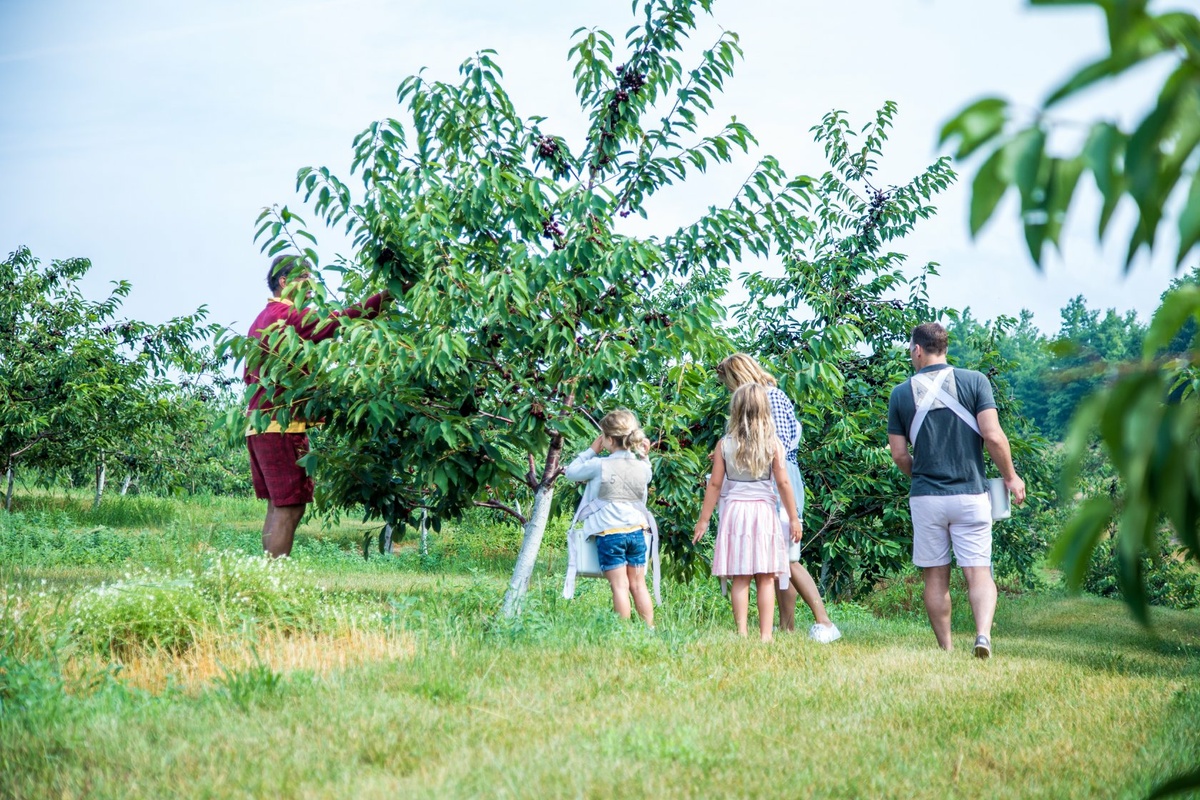
A Series Of Unfortunate Events: Northern Michigan's Dismal Cherry Season
By Craig Manning | Aug. 19, 2024
A bloodbath: That’s how local cherry industry experts describe the 2024 growing season. Between an onslaught of devastating pest activity and hugely elevated levels of mold and disease pressures caused by heavy spring rain and high humidity, many northern Michigan cherry farmers found huge percentages of their crops to be unsuitable for the marketplace this year.
It’s a harsh blow for an embattled industry already contending with big challenges elsewhere, such as flagging tart cherry prices and aggressive competition from foreign growers. And while cherry farmers stop short of calling the season the worst ever, some industry insiders say 2024 could prove to be the final straw for at least a few cherry growers in the Leelanau and Grand Traverse regions.
“In a summary, it was a disaster,” says Philip Hallstedt, who owns the Northport U-pick cherry farm Hallstedt Homestead Cherries. “For sweet cherries, rain, wind whip, and humidity set the stage for high infestation of European brown rot and spotted wing drosophila. A fellow farmer shared that 90 percent of his sweet cherry harvest was lost – which is tough, as sweet cherries are the cash crop for many growers to sustain their operations, given that tart prices are so low.”
Brown rot is a fungal infection that attacks flowering cherry trees and hampers their ability to produce fruit. The disease thrives off high moisture levels and spreads in windy conditions, making this year’s humid, rainy, breezy spring a perfect storm for mass cherry crop impact. Meanwhile, spotted wing drosophila (SWD) is an invasive fruit fly species native to Asia but first identified in Michigan in the fall of 2010. Since then, the pest has become arguably the top concern for Michigan cherry growers, according to Michigan State University Extension. SWD attack ripening fruit and lay eggs inside, not only compromising cherry quality but also triggering further proliferation and infestation. Per MSU, a single SWD female “is capable of laying 300+ eggs,” which can then develop into adults “in as little as eight days.”
To add insult to injury, the 2024 cherry season actually started off promisingly. According to Hallstedt, cherry farmers typically experience what is known as “June drop,” where a cherry tree “senses its crop load” and then sheds unpollinated or damaged cherries as an act of selecting which cherries have the best chance at reaching maturity. This year, June drop was atypically small, which cleared the way for what might have become one of the biggest sweet cherry crops in recent memory.
Mother Nature had other plans.
According to professional cherry industry field scouts from the agribusiness consulting firm Wilbur-Ellis, farmers in Michigan got hammered by so many rain events so quickly that most didn’t have enough time to protect their crops – such as through the application of fungicides – before the next storm arrived. That kind of excessive moisture is bad for sweet cherries even without factoring in disease pressure or pests, as it causes the fruit to swell and split. Add brown rot and a huge population of SWD – the product of the historically mild 2023-24 winter – and this year’s cherry crop quickly crashed.
There have been worse years before, at least from the perspective of the cherry-loving consumer. The mild winter, warm spring, and minimal June drop meant locals were eating sweet cherries by the beginning of July – an anomaly, given that local cherries are rarely even ready in time for Traverse City’s National Cherry Festival. Speaking at a press conference last week, Emily Miezio – a cherry farmer at Traverse City’s Cherry Bay Orchards – also noted that there have been years where late winter weather completely obliterated the crop. Miezio said in both 2002 and 2012, most farmers “didn’t shake anything” off their trees because there were no cherries left to harvest.
Aside from those total-loss years, though, Miezio admitted that 2024 might go down in history as one of northern Michigan’s worst cherry harvests ever.
Hallstedt echoes the concerns about fruit quality, noting that he and his wife closed down their U-pick operation early because there just wasn’t enough good fruit left on the trees to offer a strong customer experience. Even before that, Hallstedt and his team were warning visitors they might come across more bad fruit in the orchards this year.
“We tried to use it as a way to educate people about the industry and how difficult it is to bring this very, very special fruit to market every year,” Hallstedt says.
Wilbur-Ellis scouts tell the Leelanau Ticker they’ve seen a steady drop-off in their cherry farming clientele over the past few years, as industry challenges have caused growers to throw in the towel. The scouts worry a dire season like this one could exacerbate the exodus.
Even this year, Hallstedt says he noticed a neighboring cherry farmer had decided to skip harvest entirely. Such a decision is a cutting of losses – a way for farmers to lessen the blow of a poor-quality crop by avoiding the expenses of tree care, fungicide or insecticide treatments, and harvest. The drawback is that neglected trees then become breeding grounds for pests and disease, putting more pressure on neighboring farms.
“When you leave the fruit on the trees, it hurts everybody else – especially from an SWD perspective,” Hallstedt says. “The flies are in there feeding on the fruit that’s been abandoned, and then the populations of SWD just keep growing.”
There might be a lifeline coming, though. Earlier this month, Governor Gretchen Whitmer submitted a letter to the United States Department of Agriculture asking for a federal disaster declaration for the Michigan sweet cherry industry, which would open the door to federal assistance, which could help keep struggling farms afloat.
In her letter to the USDA, Whitmer noted that state officials are estimating a 30-75 percent loss of this year’s sweet cherry crop.
CommentThe Latest Leelanau County Blotter & 911 Call Report
The Leelanau Ticker is back with a look at the most alarming, offbeat, or otherwise newsworthy calls …
Read More >>Top 8: Comeback Stories Were The Recurring Theme In Leelanau's Biggest News Of 2025
Don’t call it a comeback…except, maybe do! Returns and resurrections seemed to be the prevailing theme in …
Read More >>Property Watch: Bright and Cozy in Maple City
This brand new listing offers a smallish but updated home near Maple City.
"This well-kept 3-bedroom, 2-bath …
Read More >>Amazon Deliveries Provide Small Business Boost in Leelanau County
An online retailing behemoth that’s often criticized for putting the squeeze on small businesses is now providing …
Read More >>



